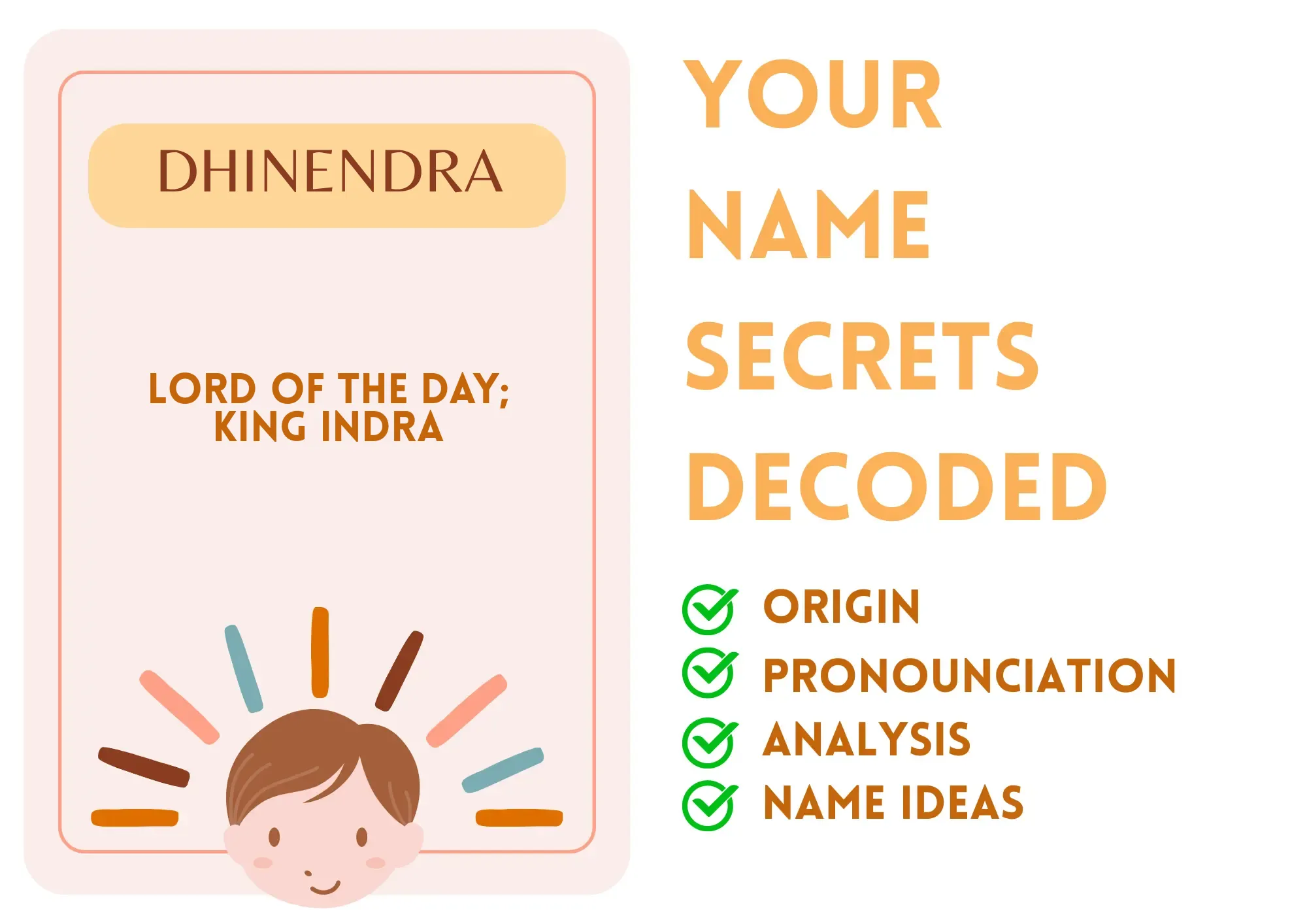
Dhinendra
Dhinendra is a distinguished name of Sanskrit origin that combines the elements 'Dhin' (representing the day or activities associated with the day) and 'Indra' (often referring to the king of gods in Hindu mythology). This name is primarily used in Indian culture and is considered masculine. Dhinendra reflects dynamism, nobility, and authority. In Hinduism, Indra represents power and kingship, making the name significant for those seeking auspicious traits for their child.
The name Dhinendra is well-regarded and evokes feelings of strength and leadership. It provides a deep cultural connection and is relatively easy to pronounce and write, which makes it appealing to many parents.
Historically, Dhinendra and its components can be found across various Sanskrit texts and are respected within cultural narratives, adding to the richness of the name's heritage.
Basic Information
Gender: Boy
Sounds Like: DHEE-nehnd-rah
Pronunciation Explanation: The name has three syllables, with the emphasis on the first one 'DHEE', followed by 'nehnd' and a light ending 'rah'.
Summary and Meaning
Meaning: lord of the day; king Indra
Origin: Dhinendra has Indian origins, specifically deriving from Sanskrit, a classical language key to Hinduism and several Indian cultures.
Usage: Traditionally a masculine name, Dhinendra is exclusively used for boys and conveys a sense of strength and rulership.
Name Number (Chaldean)
Name Number (Pythagorean)
Name Constellation (Nakshatra)
Name Zodiac Sign (Rashi)
Popularity (Global Rank)
Overall: 718509
Boys: 72681
Most Popular in
Religious and Cultural Significance
Religion: Hindu
Background: In Hindu belief, Indra is the king of gods and the god of rain, thunderstorms, and war, indicating that Dhinendra carries divine significance and leadership qualities.
Cultural Significance: Dhinendra is celebrated in literature and tradition, often signifying power, majesty, and auspicious beginnings.
Historical Significance: The name has historical roots within Hindu texts and scripture where Indra is depicted as a protector and ruler, enriching its cultural narrative.
Popular Culture
Literature and Mythology: Dhinendra appears in various traditional stories associated with gods, emphasizing divine challenges and victories.
Movies and Television: While less common in modern popular culture, variations of the name Indra appear in numerous Indian films and TV shows that exemplify strength and authority.
Feelings and Perceptions
Perception: Dhinendra is perceived positively, conveying qualities of strength, leadership, and nobility. It is appreciated for both its cultural depth and its lyrical sound.
Positive Feelings: Noble, strong, auspicious, unique, and culturally rich.
Negative Feelings: May be considered rare or unfamiliar, leading to mispronunciation or difficulty spelling for some.
Practical Considerations
Ease of Writing and Calling: Dhinendra is moderately easy to write and pronounce, comprising eight letters and three syllables; it has a melodious quality that makes it pleasant to call out.
Common Typos and Misspellings: Dinendra,Dhnendra,Dhinindr,Dinindra
Common Nicknames: Dhi,Dinu,Dhin
Dhinendra Popularity
Dhinendra Usage and Popularity By Country
| Country | Rank (Overall) |
|---|---|
| India | 188637 |
| United States | 344452 |
Dhinendra Usage and Popularity By City
| City | Rank (Overall) |
|---|
Compatibility Analysis
Famous Persons Named Dhinendra
No results found for Dhinendra.
Related Names
Similar Sounding Names:
Dinesh,Indra,Dhiren,Din